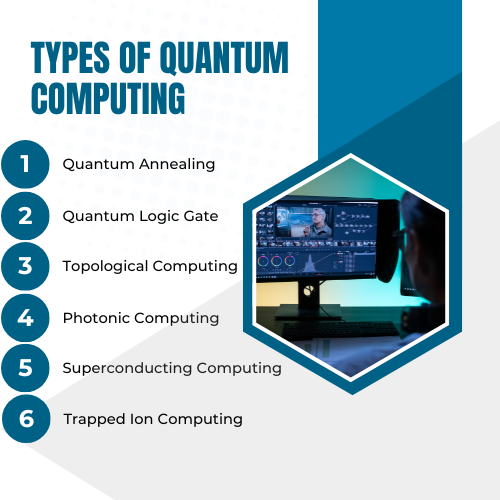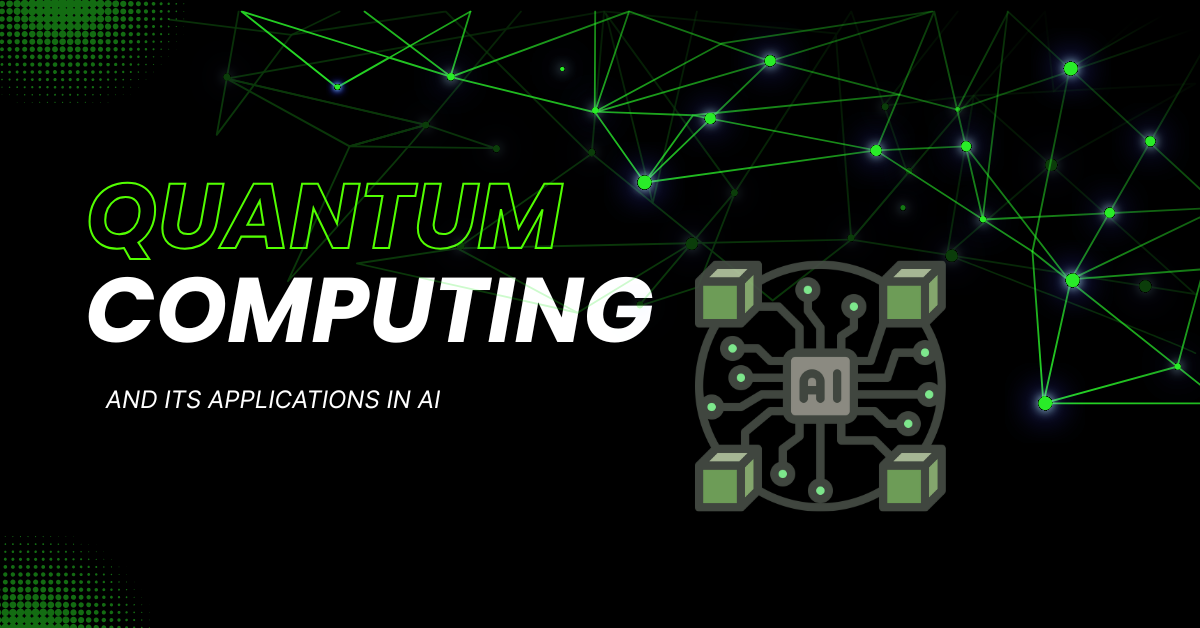Quantum computing is a new and exciting technology that can solve complex problems much faster than today’s computers. When combined with Artificial Intelligence (AI), it can help machines learn and make decisions more efficiently. This blend of quantum computing and AI can bring major changes across industries like healthcare, finance, transportation, and more.
How Is Quantum Computing Different from Regular Computing?
In regular (classical) computers, information is stored in bits that are either 0 or 1. But in quantum computers, information is stored in qubits, which can be both 0 and 1 at the same time. This helps quantum computers handle large and complex calculations very quickly.
Key Concepts: Qubits, Superposition, and Entanglement
Qubits are the building blocks of quantum computing.
Superposition allows qubits to be in multiple states at once.
Entanglement links qubits together so that a change in one instantly affects the other, even if they are far apart.
Quantum Circuits and Gates in Simple Terms
Think of quantum gates like tools that help qubits change states. These gates are combined to build quantum circuits, which are used to solve specific problems or run programs.
What is Quantum Computing?
Quantum computing is a cutting-edge technology that uses the principles of quantum mechanics to process information far beyond the capabilities of classical computers. Instead of bits that are either 0 or 1, it uses qubits, which can be 0, 1, or both at the same time (superposition). This allows quantum computers to work on many possibilities in parallel, greatly speeding up certain calculations.
Another key feature is entanglement, where qubits become linked so that the state of one instantly affects the other, enabling faster and more complex problem-solving. These abilities make quantum computing powerful for tasks like molecular simulations, drug discovery, cryptography, optimization, and AI.
While the technology is still in its early stages—requiring extreme conditions to keep qubits stable—research by companies like Google and IBM is rapidly advancing toward practical, large-scale quantum machines. If successful, quantum computing could transform industries and solve problems classical computers cannot.
Types of Quantum Computing

Quantum computing can be classified into six main types, based on how qubits are implemented and the problems they are designed to solve:
1. Quantum Annealing
Focused on solving optimization problems.
Finds the most optimal solution by using quantum tunneling to escape local minima.
Example: D-Wave systems.
2. Universal Gate-Based Quantum Computing
The most versatile model that can run any quantum algorithm.
Uses quantum gates to manipulate qubits for complex computations.
Example: IBM Quantum, Google Quantum AI.
3. Topological Quantum Computing
Uses anyons and braiding techniques to store information.
Highly resistant to errors, making it more stable for long computations.
Example: Microsoft’s research on topological qubits.
4. Photonic Quantum Computing
Uses photons (light particles) as qubits.
Works at room temperature and is ideal for quantum communication.
Example: Xanadu, PsiQuantum.
5. Superconducting Quantum Computing
Uses superconducting circuits cooled near absolute zero.
Offers fast gate operations and scalability potential.
Example: Google Sycamore, IBM Q System.
6. Trapped Ion Quantum Computing
Uses ions trapped in electromagnetic fields as qubits.
Known for high precision and long qubit coherence times.
Example: IonQ, Honeywell Quantum Solutions.
What Is Artificial Intelligence (AI)?
Artificial Intelligence (AI) is the branch of computer science that focuses on creating machines or software capable of performing tasks that typically require human intelligence. These tasks include problem-solving, learning from experience, understanding language, recognizing patterns, and making decisions. AI systems can adapt and improve their performance over time, enabling applications like virtual assistants, self-driving cars, medical diagnosis, and more.
Why Quantum Computing Is Important for AI
Quantum computing is important for AI because it can process vast amounts of data and complex calculations much faster than classical computers. By using qubits, quantum computers can explore multiple possibilities at once, making AI tasks like training models, pattern recognition, and optimization more efficient. This speed and capability could lead to breakthroughs in areas such as natural language processing, drug discovery, autonomous systems, and advanced problem-solving that are currently limited by traditional computing power.
Applications of Quantum Computing in AI
1. Quantum Machine Learning (QML)
Quantum algorithms can enhance machine learning models by processing large datasets faster and more efficiently. QML leverages quantum principles to:
Reduce data dimensionality
Optimize hyperparameters more quickly
Improve classification and clustering tasks
Example: Quantum support vector machines (QSVMs) can classify complex data patterns that classical algorithms struggle with.
2. Natural Language Processing (NLP)
AI-powered language models, like chatbots and translators, rely heavily on large-scale data processing. Quantum computing can speed up NLP tasks such as:
Sentiment analysis
Context-aware translation
Speech recognition
This means more human-like and responsive AI interactions.
3. Quantum-Enhanced Neural Networks
Quantum neural networks (QNNs) combine the principles of neural networks with quantum circuits, enabling:
Faster convergence during training
Reduced energy consumption
Improved performance in recognizing complex data patterns
4. Optimization Problems in AI
Many AI applications involve optimization — from route planning in logistics to portfolio management in finance. Quantum annealing, a specific form of quantum computing, is particularly powerful for these problems, enabling:
Faster and more accurate optimization
Real-time decision-making in dynamic environments
5. Drug Discovery and Healthcare AI
Quantum computing can simulate molecular structures far more precisely than classical computers. Combined with AI’s predictive capabilities, it can:
Identify potential drug candidates quickly
Optimize treatment plans
Accelerate personalized medicine
6. Financial Modeling and Risk Analysis
AI-powered financial models often require simulation of thousands of market scenarios. Quantum computing can improve:
Predictive accuracy
Fraud detection algorithms
Real-time trading strategies
Challenges in Integrating Quantum Computing with AI
While the potential is enormous, several challenges remain:
Hardware limitations: Quantum computers are still in their early stages.
Error correction: Qubits are highly sensitive to environmental noise.
Skill gap: Few professionals currently have expertise in both quantum mechanics and AI.
Cost: Access to quantum hardware is expensive and limited.
Future Outlook
The journey of quantum computing is only at its dawn, yet the pace of innovation is accelerating rapidly. Tech giants like IBM, Google, Microsoft, and startups such as Rigetti and IonQ are investing billions into developing more stable and scalable quantum hardware. As these systems become more accessible, their integration with AI will no longer be a futuristic concept — it will be a competitive necessity.
In the next 5–10 years, we can expect:
Mainstream Quantum Cloud Platforms – Businesses will access quantum computing power through cloud-based APIs without owning expensive quantum hardware.
Ultra-Optimized AI Models – Training that currently takes weeks on classical GPUs may be reduced to mere hours, enabling faster deployment of cutting-edge models.
Breakthroughs in Complex Problem-Solving – From predicting climate patterns with unmatched precision to simulating entire cities for smarter urban planning, Quantum-AI will open problem-solving frontiers that were once thought impossible.
Industry-Specific AI Acceleration – Sectors like finance, logistics, pharmaceuticals, and energy will experience tailored quantum-powered AI tools designed to meet their unique challenges.
Collaboration Between Humans and AI – With near-instant data processing and deep pattern recognition, AI could become a real-time decision-making partner for humans, not just a tool.
Conclusion
The fusion of quantum computing and AI is set to become the foundation of the next technological revolution. This combination goes beyond the limitations of classical computers, enabling complex problems to be solved with unprecedented speed and accuracy. From drug discovery to financial analysis and climate forecasting — Quantum-AI is opening doors to possibilities once thought unreachable.
While challenges such as hardware limitations, error correction, and high costs still exist, rapid research and investment are steadily reducing these barriers. In the coming years, this technology will completely transform how we work, think, and solve problems.
The Quantum-AI era has already begun — and its impact will be felt for generations to come.

VIPSlotsCasino… feels a little dated, but they do have some decent bonuses and a good variety of games beyond just slots. The VIP program might be worth checking out if you’re a high roller. vipslotscasino